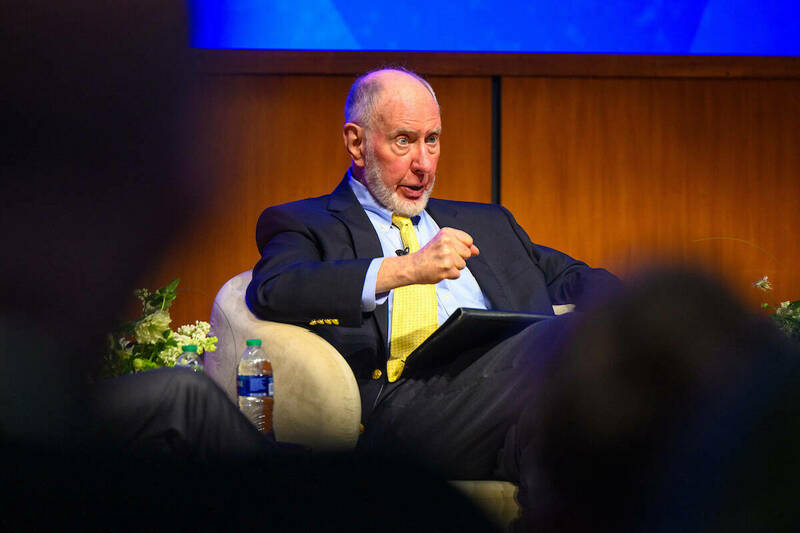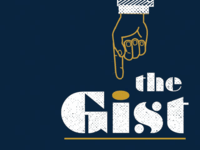 “I think (Pope Francis) is the most important figure in the world right now,” Putnam says, “because he speaks with a moral voice, unequaled, about our obligations to one another.” Photo by Matt Cashore ’94
“I think (Pope Francis) is the most important figure in the world right now,” Putnam says, “because he speaks with a moral voice, unequaled, about our obligations to one another.” Photo by Matt Cashore ’94

The fate of democracy may depend on the willingness of today’s young people to join groups and work for the betterment of all of society, according to famed social scientist Robert Putnam.
While the nation may seem hopelessly mired in political polarization and social conflict, he says, it is possible to move beyond that. “Things are not determined by history. We have agency,” Putnam, a research professor emeritus of public policy at Harvard University, told an audience on February 21 in Jordan Auditorium in the Mendoza College of Business.
“If you don’t do it, nobody will do it. It’s up to you,” Putnam said, directly addressing the many students in the full auditorium. “It’s your choice. Are we going back to a better society or not?”
The discussion came after a screening of Join or Die, a new film exploring Putnam’s research about why he thinks Americans should join clubs and how the fate of the nation may depend upon it.
The film is based on Putnam’s 2000 best-selling book, Bowling Alone: The Collapse and Revival of American Community, which explores the nation’s decades-long decline in community connections and related threats to democracy. Putnam centers his work on social capital — the networks of connections between individuals and the norms of reciprocity and trustworthiness that arise from them — and how such links impact democracy.
The event was part of the 2023-24 Notre Dame Forum series, focused on the future of democracy.
Putnam joined in discussion with David Campbell, the Packey J. Dee Professor of American Democracy and director of the University’s new Democracy Initiative. Putnam and Campbell co-wrote a 2010 book, American Grace: How Religion Divides and Unites Us. The conversation was moderated by Jaimie Bleck, associate professor of political science.
Putnam is the author of 15 books and former dean of Harvard University’s Kennedy School. He has received many honors, including the National Humanities Medal, the nation’s highest honor for contributions to the humanities.
“At a time when many scholars focus on narrow questions, Professor Putnam has made a career of tackling big issues,” Notre Dame President-elect Father Robert A. Dowd, CSC, ’87 said in welcoming the audience. “His research on the importance of civic engagement, social connections and strong communities to the survival of democracy has been influential around the world.”
Putnam’s 2020 book, The Upswing: How America Came Together a Century Ago and How We Can Do It Again, recounts the fiercely polarized Gilded Age of the late 1800s and the ways citizens became more cooperative and focused on their responsibility to each other in the early 20th century.
Following are selections from Putnam’s comments.
How 2024 may be a pivotal year for Americans:
You don’t have to be an academic. You can see that we’re in a pickle. . . . We’re all very divided economically, very divided socially, very polarized politically, very centered on me, me, me.
I think that many people think this year is a big deal because so many places — and above all the United States — are on a knife’s edge. Either we become a more we-focused society or a more I-focused society.
On how the United States has previously overcome periods of discord and polarization:
“The last time we went through that — at the turn of the 19th to the 20th century — it wasn’t guaranteed things were going to work out and many people thought we were going to hell. It was only because some individuals — especially some young people, just like you — decided to stand up and act together to push us in a better direction. That fundamental cause was not by some inevitable pendulum of history.
On Pope Francis:
I think Pope Francis is the most important figure in the world. I’m not Catholic. I’m hardly religious. But I think he’s the most important figure in the world right now, because he speaks with a moral voice, unequaled, about our obligations to one another. . . . If he didn’t exist, we secular Jews would have to invent him.
On how algorithms used by Facebook and other social media sow discord:
They know that their algorithm is causing polarization. That’s a choice they made. That’s not intrinsic in the technology. To some extent, it is our fault: how we choose to use the internet. But I also think it’s (Meta/Facebook CEO) Mark Zuckerberg’s fault. . . . He had it within his power to use a different business model and chose not to.
How students should seek out groups to join after they finish college:
I would hope that as those joiners on campus go out into the world, the groups that they form are not simply with people like themselves. That’s the risk, because the real genius of associations — whether they're formal or informal — is when people come together across class lines and racial lines and religious lines.
Margaret Fosmoe is an associate editor of this magazine.